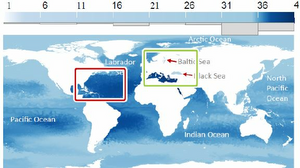Information
- Publication Type: Journal Paper (without talk)
- Workgroup(s)/Project(s):
- Date: September 2021
- DOI: 10.1109/TVCG.2021.3109014
- Journal: IEEE Transactions on Visualization and Computer Graphics
- Open Access: yes
- Volume: 9
- Pages: 1 – 15
Abstract
Colormapping is an effective and popular visualization technique for analyzing patterns in scalar fields. Scientists usually adjust a default colormap to show hidden patterns by shifting the colors in a trial-and-error process. To improve efficiency, efforts have been made to automate the colormap adjustment process based on data properties (e.g., statistical data value or distribution). However, as the data properties have no direct correlation to the spatial variations, previous methods may be insufficient to reveal the dynamic range of spatial variations hidden in the data. To address the above issues, we conduct a pilot analysis with domain experts and summarize three requirements for the colormap adjustment process. Based on the requirements, we formulate colormap adjustment as an objective function, composed of a boundary term and a fidelity term, which is flexible enough to support interactive functionalities. We compare our approach with alternative methods under a quantitative measure and a qualitative user study (25 participants), based on a set of data with broad distribution diversity. We further evaluate our approach via three case studies with six domain experts. Our method is not necessarily more optimal than alternative methods of revealing patterns, but rather is an additional color adjustment option for exploring data with a dynamic range of spatial variations.Additional Files and Images
Weblinks
BibTeX
@article{Zeng_2021,
title = "Data-Driven Colormap Adjustment for Exploring Spatial
Variations in Scalar Fields",
author = "Quiong Zeng and Yinqiao Zhao and Teng Zhang and Yi Ciao and
Changhe TU and Ivan Viola and Yunhai Wang",
year = "2021",
abstract = "Colormapping is an effective and popular visualization
technique for analyzing patterns in scalar fields.
Scientists usually adjust a default colormap to show hidden
patterns by shifting the colors in a trial-and-error
process. To improve efficiency, efforts have been made to
automate the colormap adjustment process based on data
properties (e.g., statistical data value or distribution).
However, as the data properties have no direct correlation
to the spatial variations, previous methods may be
insufficient to reveal the dynamic range of spatial
variations hidden in the data. To address the above issues,
we conduct a pilot analysis with domain experts and
summarize three requirements for the colormap adjustment
process. Based on the requirements, we formulate colormap
adjustment as an objective function, composed of a boundary
term and a fidelity term, which is flexible enough to
support interactive functionalities. We compare our approach
with alternative methods under a quantitative measure and a
qualitative user study (25 participants), based on a set of
data with broad distribution diversity. We further evaluate
our approach via three case studies with six domain experts.
Our method is not necessarily more optimal than alternative
methods of revealing patterns, but rather is an additional
color adjustment option for exploring data with a dynamic
range of spatial variations.",
month = sep,
doi = "10.1109/TVCG.2021.3109014",
journal = "IEEE Transactions on Visualization and Computer Graphics",
volume = "9",
pages = "1--15",
URL = "https://www.cg.tuwien.ac.at/research/publications/2021/Zeng_2021/",
}


 Image
Image Paper
Paper
